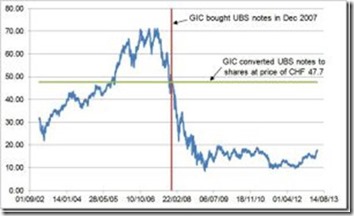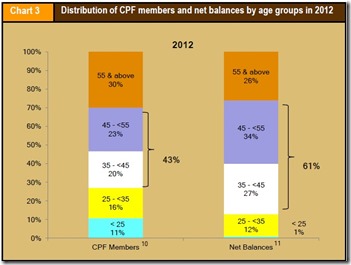- Joined
- Oct 26, 2008
- Messages
- 923
- Points
- 0
[h=2]Any change to the CPF system will take into account the income needs of Singaporeans in their retirement years. One area being looked at is whether it's possible to have different Minimum Sums for different groups, depending on their needs, said Manpower Minister Tan Chuan-Jin.[/h]
 The CPF Building at Robinson Road. (Photo: TODAY)
The CPF Building at Robinson Road. (Photo: TODAY)
SINGAPORE: Any change to the CPF system will take into account the income needs of Singaporeans in their retirement years. One area being looked at is whether it's possible to have different Minimum Sums for different groups, depending on their needs.
Manpower Minister Tan Chuan-Jin made these comments when asked about his thoughts on the review of the CPF system which is currently under way. But he also warned that providing more options would make the system more complicated.
Since November, the panel tasked with reviewing the CPF system has held several focus group discussions. One thing stood out - people value the CPF system. But there are differing views on how to make it better.
The Manpower Minister said the fundamental role of the CPF has not changed and that is to provide for one's financial adequacy during one's retirement years for healthcare and housing. The key is to establish how much flexibility to work into the system and whether more options can be provided.
A range of options is being considered. For example, a different Minimum Sum for different groups of people. The Minimum Sum is the amount one sets aside upon reaching age 55 to ensure some regular income upon retirement at 65. It now stands at $155,000. It will be adjusted to $161,000 in July 2015.
Currently, if a person is unable to set aside this full amount in cash, his property - bought with his CPF savings - will be automatically pledged, for up to half of his Minimum Sum.
Moving forward, how much Minimum Sum one sets aside may depend on the payout that person wants. Minister Tan said: "We should be focused more on the payouts. At the end of the day, it is: what is the level of payout that we want?
"If we are happy with X amount being streamed out on a monthly basis, then obviously if we feel that that's the amount that we need to provide for, whether our basic needs or enhanced needs. That amount will then obviously need to be tied to a certain amount that you need to accumulate because that's how it works. So we may be looking at a variety of options, depending on what you are looking at."
"Even today, under the present system, if you are able to accept a smaller payout, you do a property pledge and so on, you re-use the amount that you keep, then obviously the amount being streamed out is less. So I think we are looking at various options available and then tied to these options would be differing amounts that you would need to accumulate," added the minister.
Mr Tan said: "We are also looking at the possibility of extending the amount, because there are also a number of people who want to top up their CPF but could not because there are limits. Actually many also do realise that keeping monies in the CPF makes a fair degree of sense for them as well, both in terms of the savings and the interest that's being provided.
"So, (we are looking at) whether for some who are looking for enhanced payouts, would that be a possibility of putting in more monies into the CPF beyond what it is today? That may be an option that can be considered as well. But we look at it in totality."
Such a system will essentially mean different payout levels for different people. But ironically, the groups that need the higher payouts in their later years are the vulnerable ones. Mr Tan said they are also the ones who need a higher lump sum payout, when they hit 55. The problem is: the more you take out in your early years, the less you get later.
Mr Tan said: "For those who are alright, who have other savings and so on, perhaps it's not such a huge concern. But for those who are perhaps less provided for in different ways, it has a very real impact because it does mean that your payment, your payout, on a monthly basis is reduced. So that's not trivial.
"It's particularly the vulnerable groups that get affected most. I can understand those who have other forms of savings and so on who feel that perhaps we could be more liberal but it's perhaps the vulnerable groups that need it more and oftentimes, it's the vulnerable groups that feel that pressure to want to take out the cash for more immediate needs.
Another possibility being looked at is a stream of payouts that get higher as the years go by to combat the effects of inflation. The CPF Advisory Panel is expected to submit its preliminary recommendations to the government by February next year.

SINGAPORE: Any change to the CPF system will take into account the income needs of Singaporeans in their retirement years. One area being looked at is whether it's possible to have different Minimum Sums for different groups, depending on their needs.
Manpower Minister Tan Chuan-Jin made these comments when asked about his thoughts on the review of the CPF system which is currently under way. But he also warned that providing more options would make the system more complicated.
Since November, the panel tasked with reviewing the CPF system has held several focus group discussions. One thing stood out - people value the CPF system. But there are differing views on how to make it better.
The Manpower Minister said the fundamental role of the CPF has not changed and that is to provide for one's financial adequacy during one's retirement years for healthcare and housing. The key is to establish how much flexibility to work into the system and whether more options can be provided.
A range of options is being considered. For example, a different Minimum Sum for different groups of people. The Minimum Sum is the amount one sets aside upon reaching age 55 to ensure some regular income upon retirement at 65. It now stands at $155,000. It will be adjusted to $161,000 in July 2015.
Currently, if a person is unable to set aside this full amount in cash, his property - bought with his CPF savings - will be automatically pledged, for up to half of his Minimum Sum.
Moving forward, how much Minimum Sum one sets aside may depend on the payout that person wants. Minister Tan said: "We should be focused more on the payouts. At the end of the day, it is: what is the level of payout that we want?
"If we are happy with X amount being streamed out on a monthly basis, then obviously if we feel that that's the amount that we need to provide for, whether our basic needs or enhanced needs. That amount will then obviously need to be tied to a certain amount that you need to accumulate because that's how it works. So we may be looking at a variety of options, depending on what you are looking at."
"Even today, under the present system, if you are able to accept a smaller payout, you do a property pledge and so on, you re-use the amount that you keep, then obviously the amount being streamed out is less. So I think we are looking at various options available and then tied to these options would be differing amounts that you would need to accumulate," added the minister.
Mr Tan said: "We are also looking at the possibility of extending the amount, because there are also a number of people who want to top up their CPF but could not because there are limits. Actually many also do realise that keeping monies in the CPF makes a fair degree of sense for them as well, both in terms of the savings and the interest that's being provided.
"So, (we are looking at) whether for some who are looking for enhanced payouts, would that be a possibility of putting in more monies into the CPF beyond what it is today? That may be an option that can be considered as well. But we look at it in totality."
Such a system will essentially mean different payout levels for different people. But ironically, the groups that need the higher payouts in their later years are the vulnerable ones. Mr Tan said they are also the ones who need a higher lump sum payout, when they hit 55. The problem is: the more you take out in your early years, the less you get later.
Mr Tan said: "For those who are alright, who have other savings and so on, perhaps it's not such a huge concern. But for those who are perhaps less provided for in different ways, it has a very real impact because it does mean that your payment, your payout, on a monthly basis is reduced. So that's not trivial.
"It's particularly the vulnerable groups that get affected most. I can understand those who have other forms of savings and so on who feel that perhaps we could be more liberal but it's perhaps the vulnerable groups that need it more and oftentimes, it's the vulnerable groups that feel that pressure to want to take out the cash for more immediate needs.
Another possibility being looked at is a stream of payouts that get higher as the years go by to combat the effects of inflation. The CPF Advisory Panel is expected to submit its preliminary recommendations to the government by February next year.




